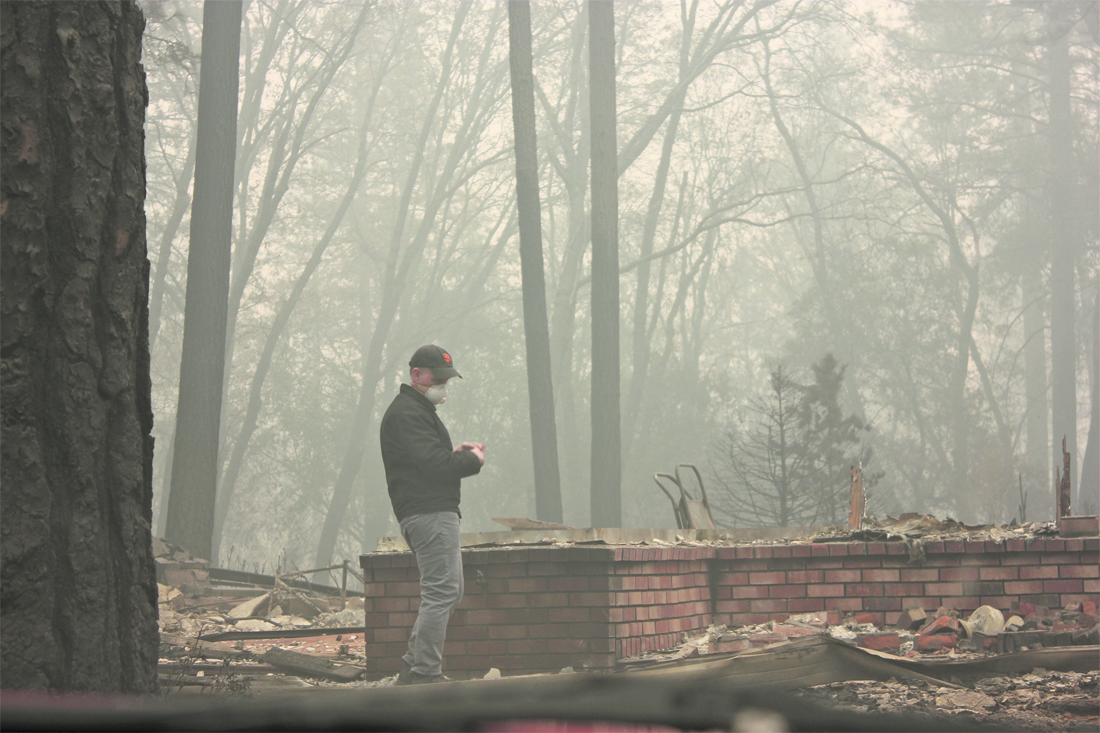
Photo by Melissa Daugherty
Two days after the Camp Fire broke out, CN&R Arts Editor Jason Cassidy takes a picture of the address marker at a friend’s destroyed Paradise home.
Maybe Conrad’s bass guitar somehow escaped the flames.
The black Fender Jaguar was nearly brand new. My lifelong friend Conrad Nystrom played it with the band we are both in—our fourth project in two decades playing music together. And in the 10 years before those, going all the way back to our teens, our friendship was born through the shared experience of escaping our culturally starved hometown of Redding by getting lost in the world of America’s punk and indie-rock underground.
I wanted nothing more than to get to the Paradise home Conrad shared with his father, rescue that symbol of our musical journey, and bring it back to my friend who’d just spent two nights sleeping on my dining room floor.
When CN&R Editor Melissa Daugherty and I turned from Pentz Road onto Bille that morning (Nov. 10, 2018), I felt encouraged by many signs of life (a jarring contrast to the still-smoldering moonscape we’d just cautiously navigated). Along both sides of the road leading to Conrad’s place, the lawns were green and most of the homes appeared intact.
At the top of his long, steep driveway, however, my pounding heart sank to the bottom of my stomach. Nothing but rubble smothered in a thick blanket of gray ash. I texted the images to my friend, and like that, he knew he’d lost everything—photos of his sons and his late mother, family heirlooms and, of course, the bass.
It might seem shallow to have been so focused on one utterly replaceable material object in the immediate aftermath of so much destruction. But, if you were to ask a musician from Paradise or Concow or the other evacuated communities, they likely would have said that, along with the family, pets and photographs, it was their instruments that they grabbed on the way out. Jazz band leader Alan Rigg told me he saved only his keyboard, an amplifier, a couple of guitars and Maggie, his Australian shepherd. Maurice “Big Mo” Huffman lost more than most—multiple homes, two businesses—yet it was the destroyed 1960 Martin acoustic guitar on which he’d worked out every song he’d ever written that he most wished he’d been able to save.
The healing process continues for those whose homes were lost, as well as those of us committed to helping. For my comparatively mild trauma, a little guidance from a longtime counselor has helped with my efforts at self care and quelling anxiety. For those who’ve suffered so much more, it’ll likely take longer to process.
But music can offer a much-needed release along the way. The songs have survived, after all. One of the first things Conrad spent his insurance money on was a brand-new Fender Jaguar bass, and I can vouch for the fact that, over the past year, it’s provided a great deal of rock ’n’ roll therapy for me, him and the rest of our noisy quartet.
Music also can bring a community together for shared comfort. As the CN&R’s arts editor and special events producer, I saw as much roughly six months after the fire, on the stage of the Sierra Nevada Big Room during the paper’s annual CAMMIES Music Festival/Awards Show.
The spotlight was on those musicians who were impacted by the fire, many of whom performed that evening. For the show’s finale, fire refugees and regulars of the burned-out Norton Buffalo Hall formed a supergroup and threw themselves into two emotional songs: a full-throated rendition of Leonard Cohen’s “Hallelujah,” and a rousing post-fire tune called “Just Breathe” that was written and led by longtime local musician Mark McKinnon.
The wounds of trauma were still fresh, and it was an inspiring, if emotionally overwhelming, experience to witness the players getting lost onstage in the one thing that remained for them all, and to bring us along for the ride.
